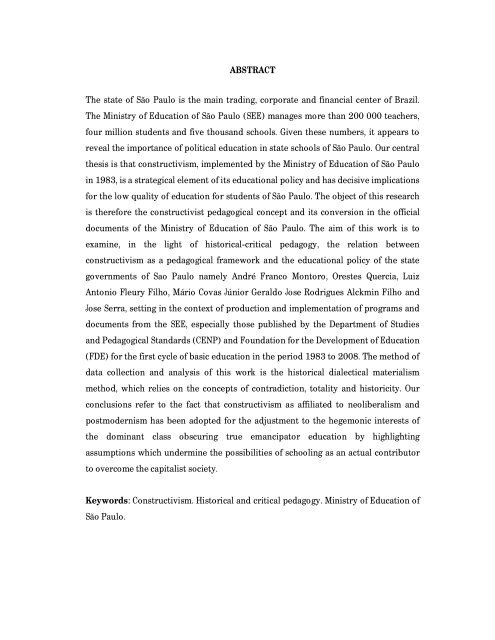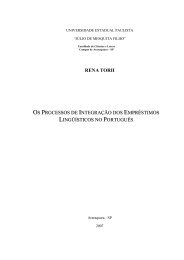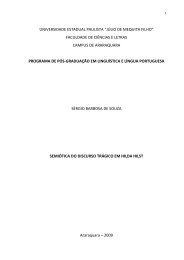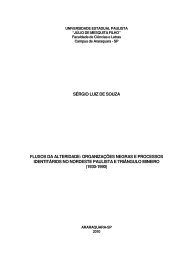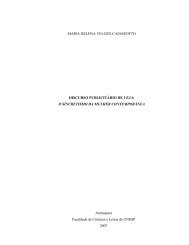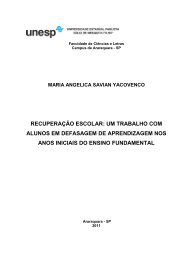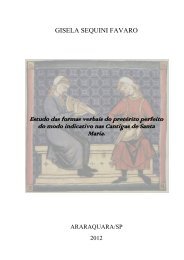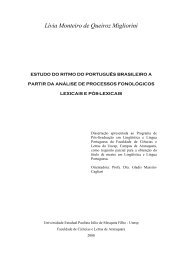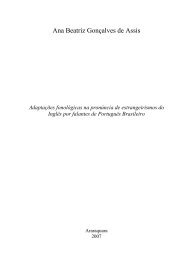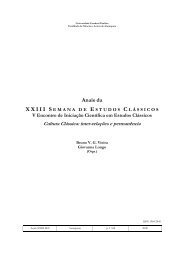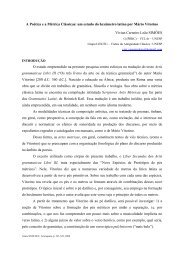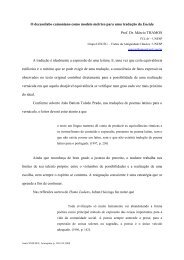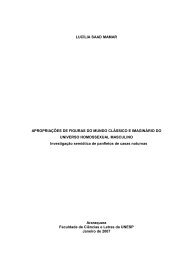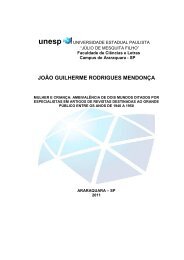- Page 1 and 2: Universidade Estadual Paulista Facu
- Page 3 and 4: Marsiglia, Ana Carolina Galvão. Um
- Page 5 and 6: Dedico esse trabalho à equipe da E
- Page 7: Ferreira (e sua mãe, Nanci e irmã
- Page 11 and 12: Programa de Educação Pré-escolar
- Page 13 and 14: 3.4 O governo Montoro .............
- Page 15 and 16: A TRAJETÓRIA DA PESQUISADORA Minha
- Page 17 and 18: São Paulo, que nos advertem sobre
- Page 19 and 20: 2008 o desempenho teve queda em por
- Page 21 and 22: José Rodrigues Alckmin Filho (2001
- Page 23 and 24: Entretanto, ao consultar pessoalmen
- Page 25 and 26: 1.1 A DEFESA DA ESCOLA E DO ENSINO
- Page 27 and 28: sociais e assim, a produção human
- Page 29 and 30: graduação de 69 instituições, 3
- Page 31 and 32: Já o objetivo é orientado pelo
- Page 33 and 34: Discordamos da interpretação de q
- Page 35 and 36: da apropriação, que o indivíduo
- Page 37 and 38: modifica-se a qualidade do pensamen
- Page 39 and 40: propriedades internas do pensamento
- Page 41 and 42: contém aquilo que o aluno não tem
- Page 43 and 44: (2003, p. 144) que “[...] o profe
- Page 45 and 46: sua escrita não apresente diferen
- Page 47 and 48: gráfico. Juntamente com a análise
- Page 49 and 50: que antes era um problema, agora n
- Page 51 and 52: Para que a relação seja modificad
- Page 53 and 54: CAPÍTULO 2 O construtivismo: orige
- Page 55 and 56: de seus verdadeiros princípios e p
- Page 57 and 58: fato de que se trata de uma pedagog
- Page 59 and 60:
à educação escolar. Tal atitude
- Page 61 and 62:
pelo homem é naturalizada e o Esta
- Page 63 and 64:
62 Em resumo, a adaptação intelec
- Page 65 and 66:
Duarte (2006c) desenvolve uma anál
- Page 67 and 68:
66 da ação na construção de no
- Page 69 and 70:
entendimento dado pelo construtivis
- Page 71 and 72:
existência de uma evolução menta
- Page 73 and 74:
Assim, no modelo construtivista, co
- Page 75 and 76:
74 excluir a possibilidade de se re
- Page 77 and 78:
se a atividade do professor, como p
- Page 79 and 80:
Essas pesquisadoras acompanharam cr
- Page 81 and 82:
Outras considerações importantes
- Page 83 and 84:
descobriu, o quê, exatamente, as l
- Page 85 and 86:
Encontra-se aqui uma incoerência d
- Page 87 and 88:
eafirma-se que o professor só deve
- Page 89 and 90:
CAPÍTULO 3 Análise de programas e
- Page 91 and 92:
(implantação do Ciclo Básico, da
- Page 93 and 94:
A partir de 1893 os grupos escolare
- Page 95 and 96:
currículo da formação de profess
- Page 97 and 98:
desse grupo. Até aposentar-se (197
- Page 99 and 100:
enovadora.” (SAVIANI, 2010, p. 33
- Page 101 and 102:
100 A “carência cultural”, que
- Page 103 and 104:
102 A década de 1980 foi marcada p
- Page 105 and 106:
104 dependência da política educa
- Page 107 and 108:
modernismo na década de 1990 fez r
- Page 109 and 110:
108 não está de acordo com a peda
- Page 111 and 112:
porque o construtivismo toma vultos
- Page 113 and 114:
112 capítulos de livros. O segundo
- Page 115 and 116:
sobrepujando a importância de conh
- Page 117 and 118:
currículo, normas etc. (POPPOVIC,
- Page 119 and 120:
preciso adequar a escola às reais
- Page 121 and 122:
do sambista alfabetizando alunos da
- Page 123 and 124:
próprio processo criativo.” (ABR
- Page 125 and 126:
124 livros, de revistas ou de filme
- Page 127 and 128:
126 De cada 100 alunos que ingressa
- Page 129 and 130:
128 trabalhos; alta rotatividade do
- Page 131 and 132:
130 Analisaremos, sobre o governo Q
- Page 133 and 134:
132 reação natural a qualquer mud
- Page 135 and 136:
e, portanto, a escola deve favorec
- Page 137 and 138:
(SÃO PAULO, 1992d 88 , p. 12). O p
- Page 139 and 140:
deslumbramento com a proposta const
- Page 141 and 142:
3.6 O GOVERNO FLEURY 140 Luis Antô
- Page 143 and 144:
142 Tivemos conhecimento de alguns
- Page 145 and 146:
inverte no segundo caso. Segundo o
- Page 147 and 148:
acaba por perder sua identidade uni
- Page 149 and 150:
ponto de vista do experimentador (n
- Page 151 and 152:
cedo para os “menos privilegiados
- Page 153 and 154:
152 Quando a criança aprende a ler
- Page 155 and 156:
4.1 A CONTINUIDADE DAS POLÍTICAS N
- Page 157 and 158:
estabelecer-se coerentemente com as
- Page 159 and 160:
formação de indivíduos para a fo
- Page 161 and 162:
160 masculino, estudos pós-colonia
- Page 163 and 164:
162 O indivíduo torna-se assim mai
- Page 165 and 166:
164 que é cobrada desses pesquisad
- Page 167 and 168:
ealidade educacional e ações real
- Page 169 and 170:
sociedade e mesmo influenciar essas
- Page 171 and 172:
170 O ensino por competências é a
- Page 173 and 174:
172 Em 2001, o Ministério da Educa
- Page 175 and 176:
174 professor organize um instrumen
- Page 177 and 178:
176 sem dúvidas, uma via vultosa p
- Page 179 and 180:
apropriações para-si. Isso porque
- Page 181 and 182:
colabore para a adequação e legib
- Page 183 and 184:
182 2010 para se candidatar à Pres
- Page 185 and 186:
toda a rede, a partir daqueles ante
- Page 187 and 188:
ação”. Acontece que a vinculaç
- Page 189 and 190:
divisões e multiplicações com n
- Page 191 and 192:
discentes devem buscar no dicionár
- Page 193 and 194:
com mais foco na alfabetização do
- Page 195 and 196:
CONSIDERAÇÕES FINAIS 194 A única
- Page 197 and 198:
196 não independentemente dos est
- Page 199 and 200:
utilizados para a manutenção do f
- Page 201 and 202:
valorizar as diferenças, respeitar
- Page 203 and 204:
BARBIERI, M. R. O ensino de ciênci
- Page 205 and 206:
COLL, C. Um marco de referência ps
- Page 207 and 208:
______________. O Construtivismo se
- Page 209 and 210:
Coordenadoria de Estudos e Normas P
- Page 211 and 212:
KRAWCZYK, N.; BRUNSTEIN, R. Sindica
- Page 213 and 214:
______________. A Formação social
- Page 215 and 216:
PARAGUASSÚ, L. PISA 2006 - Para o
- Page 217 and 218:
PRESTES, Z. R. Quando não é quase
- Page 219 and 220:
______________. Ler e escrever: PIC
- Page 221 and 222:
______________. Letra e Vida: progr
- Page 223 and 224:
______________. Decreto nº 34.035,
- Page 225 and 226:
Educação. Coordenadoria de Estudo
- Page 227 and 228:
226 VALE, J. M. F. Diálogo aberto


